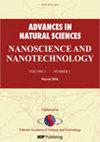Preparation and characterization of PMMA/ZnO nanocomposites for antistatic and biomedical applications
IF 2.1
Q3 MATERIALS SCIENCE, MULTIDISCIPLINARY
Advances in Natural Sciences: Nanoscience and Nanotechnology
Pub Date : 2023-07-25
DOI:10.1088/2043-6262/ace711
引用次数: 0
Abstract
Polymethyl methacrylate (PMMA)/Palm oil/ZnO nanocomposite films of concentrations 0, 0.5, 1, 2, 5, 10, and 15 wt% were prepared by solution casting technique. Tween 80 was used as a surfactant. The prepared films were characterised by different techniques in addition to antimicrobial and cytotoxicity tests. The scanning electron microscope (SEM) micrographs of fractured surfaces of the films showed that palm oil (PO) and Tween 80 enhanced ZnO NPs dispersion. An excess ZnO loading led to polymer saturation with ZnO NPs which accumulate on PMMA surface. X-ray diffraction (XRD) measurements confirmed SEM results as the crystallinity increased by ZnO NPs loading and decreased by excess loading. In addition, the presence of PO and Tween 80 enhanced thermal stability of pure PMMA and the optimum concentration is 0.5 wt% ZnO NPs. Further, the permittivity (ε′), dielectric loss (ε′′), and electrical conductivity (σ) were investigated. It was found that PO addition increased the values of ε′, ε′′, and σ of PMMA. Upon ZnO loading, these values increased up to 10 wt% ZnO NPs then decreased upon reaching 15 wt% ZnO NPs. The conductivity values revealed that the prepared nanocomposites can perform as antistatic materials for lower ZnO content and electrostatic dissipation application at 10 wt% ZnO. The antimicrobial and cytotoxicity studies revealed that the prepared films are nontoxic and the antimicrobial properties of the films against Staphylococcus aureus, Enterococcus faecalis and Candida albicans were enhanced by PO and ZnO NPs addition.抗静电和生物医学应用的PMMA/ZnO纳米复合材料的制备与表征
采用溶液浇铸法制备了浓度分别为0、0.5、1、2、5、10、15 wt%的聚甲基丙烯酸甲酯(PMMA)/棕榈油/ZnO纳米复合薄膜。吐温80被用作表面活性剂。除了抗菌和细胞毒性试验外,还用不同的技术对所制备的膜进行了表征。薄膜断裂表面的扫描电镜(SEM)显示,棕榈油(PO)和Tween 80增强了ZnO NPs的分散。过量的ZnO负载导致聚合物饱和,ZnO NPs积聚在PMMA表面。x射线衍射(XRD)证实了SEM的结果,即ZnO NPs加载增加了结晶度,过量加载降低了结晶度。此外,PO和Tween 80的存在增强了纯PMMA的热稳定性,最佳浓度为0.5 wt% ZnO NPs。进一步研究了介电常数(ε′)、介电损耗(ε′)和电导率(σ)。结果表明,PO的加入提高了PMMA的ε′、ε′和σ值。在ZnO负载下,这些值增加到10 wt% ZnO NPs,然后在达到15 wt% ZnO NPs时下降。电导率值表明,制备的纳米复合材料具有较低氧化锌含量和在10%氧化锌条件下的静电耗散性能。抗菌和细胞毒性研究表明,制备的膜无毒,PO和ZnO NPs的加入增强了膜对金黄色葡萄球菌、粪肠球菌和白色念珠菌的抗菌性能。
本文章由计算机程序翻译,如有差异,请以英文原文为准。
求助全文
约1分钟内获得全文
求助全文
来源期刊

Advances in Natural Sciences: Nanoscience and Nanotechnology
NANOSCIENCE & NANOTECHNOLOGYMATERIALS SCIE-MATERIALS SCIENCE, MULTIDISCIPLINARY
自引率
4.80%
发文量
0
 求助内容:
求助内容: 应助结果提醒方式:
应助结果提醒方式:


